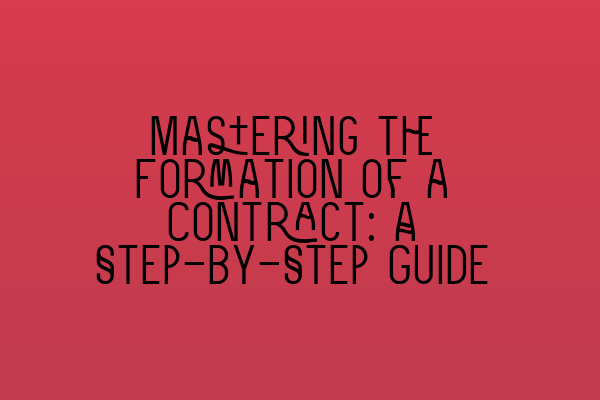Mastering the Formation of a Contract: A Step-by-Step Guide
Contracts are an integral part of any business or legal transaction. They provide the framework for parties to define their rights, obligations, and responsibilities. However, the formation of a contract can be a complex process that requires careful attention to detail. In this step-by-step guide, we will outline the key elements and considerations involved in mastering the formation of a contract.
Step 1: Offer and Acceptance
The first step in the formation of a contract is the offer. An offer is a clear statement of intent by one party to be bound by specific terms. It must be communicated to the other party with the intention of creating a legal relationship. For example, if Company A offers to sell 100 widgets to Company B for a specified price, it constitutes an offer.
The next step is acceptance. Acceptance occurs when the other party agrees to the terms of the offer without any modifications. It must be communicated to the offeror, and the acceptance must be unequivocal. If Company B agrees to purchase the widgets from Company A at the specified price, it constitutes acceptance of the offer.
It’s important to note that acceptance must be made in response to an offer. It cannot be a counteroffer, which introduces new terms or conditions. If Company B responds to Company A’s offer by proposing a different price or quantity, it would be considered a counteroffer rather than acceptance.
Step 2: Consideration
Consideration is an essential element of a valid contract. It refers to something of value that each party exchanges to bind the contract. Consideration can take various forms, such as money, goods, services, or even a promise to do or refrain from doing something. For example, if Company B agrees to pay Company A the specified price for the widgets, the consideration is the payment.
Consideration must be present on both sides of the contract. This means that each party must provide something of value to the other party. Without consideration, a contract may be deemed unenforceable or void.
Step 3: Intention to Create Legal Relations
For a contract to be valid, it must be clear that both parties intended to create legal relations. Generally, the law presumes that commercial agreements are intended to be legally binding, but this may not be the case for social or domestic arrangements. It’s essential to establish the intention to create legal relations for the contract to hold up in a court of law.
It’s worth noting that certain agreements may not be considered contracts, such as invitations to treat or advertisements. These types of communications are usually considered invitations for others to make an offer rather than offers themselves.
Step 4: Capacity to Contract
Capacity refers to the legal ability of a party to enter into a contract. Not everyone has the capacity to contract. For example, minors, individuals with mental incapacity, and certain professionals may have limited or no capacity to contract.
It’s important to ensure that all parties involved have the necessary capacity to enter into the contract. Failing to do so may render the contract void or voidable.
Step 5: Legal Formalities
Most contracts do not require any specific legal formalities. They can be oral or written, and the terms can be implied or expressly stated. However, certain types of contracts, such as those involving the sale of land or long-term agreements, may need to be in writing and comply with specific formalities. It’s important to understand the legal requirements for the specific type of contract you are working with.
Conclusion
Mastering the formation of a contract is essential for any solicitor or legal professional. By understanding the step-by-step process outlined in this guide, you can navigate the complexities of contract formation with confidence. Remember to consider the offer and acceptance, ensure there is valuable consideration, establish the intention to create legal relations, verify the capacity of the parties involved, and comply with any necessary legal formalities.
For more information on contract law and other legal topics, check out our related articles:
- Navigating Legal Challenges and Pitfalls in Your Practice
- Barrister vs. Solicitor: A Comprehensive Comparison
- Exploring Different Solicitor Specializations: Finding Your Niche
- Embracing the Rise of Virtual Law Practices
- Navigating the Maze: Demystifying Ethical Responsibilities of Solicitors
By staying up to date with new developments in contract law and continuously improving your knowledge and skills, you can become a proficient solicitor in contract law.
